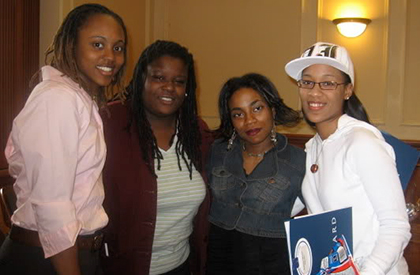The Beginning: Gender Amplified 2007
by Ebonie Smith
Posted on April 17, 2013
In the fall of 2006, I was a rising senior at Barnard College. I had just returned to the States after a semester of studying abroad in Cameroon and working in recording studios in Africa. I was jaded to say the least. I was not looking forward to yet another year of academic rigor and the 100-page senior thesis requirement that was waiting for me.
I purchased some music production equipment, and I found myself locked away for hours in my dorm room between classes learning how to produce music and recording my friends. I thought, ‘If only I could just do this. I wish that I could produce music for my coursework requirements.’ In the wake of my frustration, what followed was a bright idea: I could write my senior thesis on music production. I immediately enrolled in the only two music production classes I could find at Columbia. My enthusiasm for my classes was instantly re-established, and I was off to learn as much history about music production as I could. I focused on hip hop to further truncate my research, and I started to learn much about the cultural significance of music technologies and their influence on the development of hip hop music. I identified the names of several key male producers over and over again as I gathered sources. I never came across any names of female music producers. This seemed odd to me.
I consulted Kim Hall, my thesis advisor, about this issue, and I proposed that we create a conference called Gender Amplified: Women and Technological Innovation in Hip Hop. I felt that women’s lack of visibility in hip hop music production was both an academic and a feminist discourse. Given this, Barnard College seemed to be the perfect place to spearhead the Gender Amplified movement.

Planning an academic conference, producing music and writing a senior thesis simultaneous was no walk in the park, but so many wonderful partners came on board to help bring my vision to fruition. Tachelle Wilks (founder, Femmixx.com), The Barnard Center for Research on Women, The Africana Studies Program, and Dean Vivian Taylor (campus coordinator, The Mellon Mays Undergraduate Fellowship) all provided a tremendous support system.
On April 14, 2007, the day of the event, my mother flew in. I was too excited to eat anything. It was a beautiful day outside and women from all around the New York City metro area came to take part. The day’s events included the following segments:
Gender Amplified: Women & Technological Innovation in Hip Hop
April 14, 2007 – Event Schedule10-11AM
Push Up The Faders (Meet and Greet)Networking Brunch
Members/collectives of the hip hop community coming together, dialoguing, and forming new ties.11:30AM-1PM
Keynote Address by Tricia Rose
Tweaking the Levels: A Lecture Addressing Women in Hip Hop and Technology1:45-2:15PM
Screening: Lady Beat Makers, Vol 1
Where are the female hip hop producers? Through a collection of interviews with underground female record producers, this documentary assesses the relative absence of women from the recording industry and speculates about the future of women in the game.2:30-3:30PM
Three Generations of Hip Hop
Conversation with DJ Spinderella conducted by Imani Perry, Rutgers University4-6PM
Gender in Real-Time: Tracking Women and Technology
Panel discussion moderated by Barnard senior, Ebonie Smith, with audience segment.
Tachelle “Shamash” Wilkes, founder of Femmixx.com
Max Perez, BET Music Producer
Steven G. Fullwood, The Hip Hop Archives (The Schomburg Center for Research in Black Culture)8-10PM
Gender Amplified Showcase
DJ Showcase Featuring:
DJ Rheka
DJ Sparkles
DJ Ayana Soyini
We accomplished much with this initial event in 2007. However, the movement continues on. Gender Amplified is much bigger than hip hop. The forthcoming Gender Amplified Music Festival will do more than ask questions about women in music production. It intends to create a platform for women in music production to help them advance and meet like-minded collaborators. Gender Amplified 2013 is a launching pad for women and girls who may become interested in music production. We are building a legacy.
